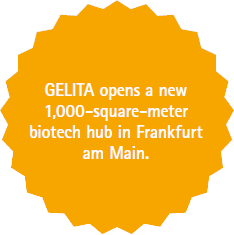Innovation
Starke Sehnen und Bänder für Sportler
White Tissue, Part 1:
TENDOFORTE®
GELITA goes biotech
Four of the Biotech Hub’s five employees (f. l. t. r.): Dr Christoph Schorsch (Lab Head), Dr Christiane Sonntag (Team Leader Strain Development), Apilaasha Tharmasothirajan (Team Leader Bioprocess Development) and Dr Markus Dick (Team Leader Analytics & DSP).


Developing a non-animal alternative for collagen: This is the goal GELITA is pursuing with its new Biotech Hub in Frankfurt am Main – and thus expanding its core competencies.
All the equipment has been installed, all approvals have been obtained, and the new GELITA Biotech Hub will officially open this summer. The laboratory is 1,000 square meters in size and includes a clean room for medical products. The company already employs five people for the new area, and in the future up to 18 employees are expected to work there. “In times when vegetarian or even vegan diets are becoming increasingly relevant for some consumer groups, we need non-animal alternatives for collagen,” explains Dr Martin Hahn, Head of Global Emerging Platforms and Technologies at GELITA. The Frankfurt site is ideal, as GELITA can take advantage of synergy effects here through a network with other companies in the biotech sector. “We operate in a dynamic environment. Collaborating with other specialists allows us to follow the latest developments in the scientific community.” At the Biotech Hub, GELITA teaches microorganisms such as yeasts or fungal systems to produce a protein in high purity. Since the organisms cannot do this on their own, this information must be implanted into them. The products obtained in this way are then tested by GELITA and examined for their new properties. “Initial tests show that such biotechnologically produced collagen peptides can improve the stimulation of collagen biosynthesis,” says Dr Hahn. The benefits may relate to technical or physiological properties. For example, it is conceivable that the gel strength and melting point of non-animal gelatin can also be influenced. “There will be many opportunities for new areas of application to implement individual customer requests in a more targeted way in the future.”
The non-animal collagen alternatives are particularly interesting, for instance to companies operating in Muslim markets or whose customers reject animal products. Since the new peptides are very efficient, lower dosages may make new dosage forms – such as capsules or tablets – interesting in the future. So far, this has always been a utopian concept,” says Dr Hahn, providing an outlook on the potential of non-animal collagen alternatives.
MORE INFORMATION:
Dr. Martin Hahn
Tel. +49 (0) 6271 84-2589
martin.hahn@gelita.com




